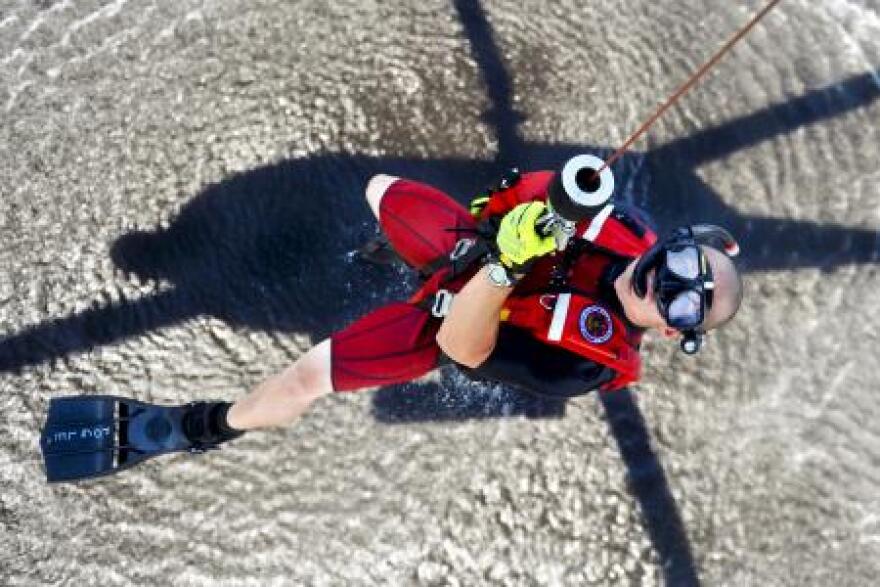When the U.S. Coast Guard responds to an emergency off the North Carolina coast, they don’t expect the call for help to be a hoax. Unfortunately, these events occur more than you think. Responding to false distress calls is not only expensive, it can put rescue personnel in dangerous situations. A local man was recently sentenced to prison for making hoax calls to the U.S. Coast Guard in October 2013. Sarah Finch has more.
It’s the familiar fable of the boy who cried wolf, but in this case, with very costly consequences.
“Mayday! Mayday! Help! Help! We’re sinking!”
In the case of Brandon Garner of Beaufort, there was no actual crisis. He and Charles Dowd Jr., both claimed that a vessel with five adults and two children was taking on water and sinking near the Core Creek Bridge in Beaufort.
“There’s two life jackets and there’s seven people. There’s one still on the vessel, we’re trying to get the other one off!”
The Coast Guard received 69 calls over a 50 minute period. A helicopter from the Marine Corps Air Station at Cherry Point, a towboat from a local salvage company; and emergency responders from the Sheriff’s office and two fire departments were deployed to assist in the search and rescue effort. However, when response crews arrived within 40 minutes of the initial call they found no vessel or people in distress. Ultimately the U.S. Coast Guard determined the broadcast was a hoax.
Calls like this are all treated the same way as a genuine emergency. Command Center Chief for the Coast Guard in Wilmington Lieutenant Lane Munroe says they fielded 451 distress calls on the North Carolina coast last year, of which seven are suspected to be phony.

“The Coast Guard will always respond as if it’s real. We will go thru all of our procedures for search effort and asset allocation, to make sure we‘ve exhausted a reasonably prudent effort to both advocate for the mariner who may be in distress, but also for the safety of the crews.”
From the high seas to the coastal rivers, a Marine band radio or VHF radio can contact the Coast Guard through channel 16, which is the International Hailing and Distress frequency. Lt. Munroe says with every mayday broadcast received, the Coast Guard Investigative Service springs into action to verify the legitimacy of the situation.
“During that effort, the Coast Guard will also conduct an investigative process, either thru extended phone calls, broadcasts, queries of other vessels in the area, to determine if this is a reasonable broadcast or a hoax.”
They work closely with local law enforcement and civilians who report additional imperative information. The Coast Guard can track the source of the marine band radio or cell phone signals through triangulation from 911 dispatch and cell phone towers. All of this evidence is then passed on to the US Attorney’s office for a verdict on the case.
Deputy Criminal Chief in the US Attorney’s Office Felice Corpening says it’s a very serious offense to squander Coast Guard resources when no distress actually exists.
“Their lives are put at risk every time they respond to a call. So when a person willfully and knowingly makes a false distress call, we will do everything necessary to prosecute that person to bring about the appropriate resolution to that type of behavior.”
In addition to putting emergency responders in harm’s way, fake mayday calls tie up resources in the event of a real emergency. They’re also expensive. Lt. Munroe says most rescue efforts cost 10 to 100 thousand dollars. The price can quickly increase if the Coast Guard dispatches helicopters or calls in local fire department crews, ferry boat operators or a Marine Corps rescue helicopter.

“Any broadcast made to the Coast Guard with an intent to deceive, where no distress exists, would constitute a hoax broadcast or a false distress broadcast and that’s a felony.”
Penalties for a false distress call can include up to 6 years in prison, a $5,000 dollar civil fine, up to $250,000 dollars in criminal fines, and reimbursement to the Coast Guard for any search efforts expended. Additionally each transmission is a separate felony and in the case of minors, parents or guardians would ultimately be responsible for their children’s behavior.
“Some of the adults are panicking. But land is probably 50-60 feet away!”
After being indicted for making false distress calls, Brandon Garner recently pleaded guilty and was sentenced to 28 months in prison and ordered to pay over $18,000 dollars in restitution. Last year, a similar case involving Homer Lewis Blackburn of Atlantic Beach, incurred a sentence of 18 months in federal prison and more than $288,000 dollars in restitution.
Lt. Munroe encourages mariners who feel that they are in danger to never hesitate to call the Coast Guard. Any physical threat to life, limb or property is a valid cause for their help.
“Anybody at any time who believes that they are in peril or need assistance from the Coast Guard or are calling to report some sort of hazardous condition, should always feel free and encouraged to call their local Coast Guard.”
Lt. Munroe says they will continue to pursue all distress broadcasts as if they are real, until proven otherwise. The U.S. Coast Guard has a long and proud history of life-saving operations. For over two centuries they have safeguarded our Nation’s maritime interests along our rivers, ports and at sea. Coast Guard presence and impact is seen and felt locally with nine Boat Stations along the North Carolina coast from Jacksonville and Fort Macon, to Elizabeth City and Oak Island.



